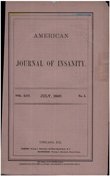Efficacy of enhanced outreach counseling to reenroll high-risk drug users 1 year after discharge from treatment
Abstract
OBJECTIVE: Because discharged methadone maintenance patients represent a population at particularly high public health risk, the authors studied such patients 1 year after their discharge from a methadone program. METHOD: The locations of 94 of 110 discharged patients were successfully determined 1 year after discharge. Nine (10%) of these patients had died, 37 (39%) were already reenrolled in treatment, and 7 (7%) did not require treatment. The 41 remaining subjects were randomly assigned to either the enhanced outreach counseling condition (N = 27) or a standard referral condition (N = 14). RESULTS: Within 2 weeks following this intervention, 17 (63%) of the 27 patients in the enhanced outreach counseling program and one (7%) of the 14 patients not in the program had reenrolled in treatment. CONCLUSIONS: These data suggest that enhanced outreach counseling may be an effective outreach strategy as well as a risk-reduction for discharged methadone maintenance patients.
Access content
To read the fulltext, please use one of the options below to sign in or purchase access.- Personal login
- Institutional Login
- Sign in via OpenAthens
- Register for access
-
Please login/register if you wish to pair your device and check access availability.
Not a subscriber?
PsychiatryOnline subscription options offer access to the DSM-5 library, books, journals, CME, and patient resources. This all-in-one virtual library provides psychiatrists and mental health professionals with key resources for diagnosis, treatment, research, and professional development.
Need more help? PsychiatryOnline Customer Service may be reached by emailing [email protected] or by calling 800-368-5777 (in the U.S.) or 703-907-7322 (outside the U.S.).



